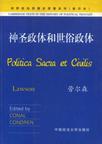神圣政体和世俗政体
2003-7
中国政法大学出版社
英乔治·劳尔森
283
无
My first thanks are to the editors of Cambridge Texts in the History ofPolitical Thought for inviting me to prepare this edition. This was donelargely in Cambridge during 1990. Specifically my thanks to RichardTuck for advice given despite the toils of bringing his edition ofLeviathan to its conclusion; to Raymond Geuss; and especially toQuentin Skinner for help and much typical kindness. During my stay inCambridge, solicited and unsolicited assistance saved hours of time. Much of this help was given during lunch at Clare Hall and duringrandom, if sometimes subversive, breaks in the University Library TeaRoom. My thanks to the denizens of the latter and to the fellows andAnthony Low, President of the former - a college of surpassingfriendliness. In particular I am grateful to Hugh Williamson for transliteratingHebrew, Pascalis Kitromilides for advice on some of the Greek, JohnKilcullen for helping with Lawson's non-citation of medieval texts.Additional thanks are due to John Morrill and Mark Goldie, and to IanMaclean, who made me feel a little less foolish for being unable to tracea reference to Grotius; to Bruce Kaye (for more Hebrew); to PaddySchreuder for all the hard work on Dr Carr's convoluted andmisprinted poem; to Averil Condren for further help, sub-editing andthe index; and to Libi Nugent for keyboard skills, intelligent attentionto detail and her wry patience. My thanks also to Laurien Berkeley forcopy-editing.I am grateful to the University of New South Wales Faculty of ArtsResearch Grants Committee for financial support. To Dona Haycraftand John Chalmers, who turned casual neighbourliness into lastingfellowship, my part in this text is dedicated.
《神圣政体和世俗政体》囊括了所有著名的经典原著,但与此同时,它又扩展了传统的评价尺度,以便能够纳入范围广泛、不那么出名的作品。每一本书都有一个评论性的导言,加上历史年表、生平梗概、进一步阅读指南,以及必要的词汇表和原文注解。
作者:(英国)英乔治·劳尔森 (George Lawson) Lawson's Politica is a systematic treatise onpolitics in Church and State, and isarguably the most significant work ofpolitical theory to have been printedduring the Restoration crisis of 1659 - 60.The work was widely discussed during theseventeenth century and its conceptualvocabulary applied in discussions of therevolution of 1688 - 9, when it was alsoposthumously republished. Despite Lawson'sfame, however, his work fell into relativeobscurity during the eighteenth centurybut has recently been the subject of renewedscholarly interest. Politica has been reassessedas both historically and theoreticallysignificant, and Lawson's contextual andinterpretative importance emphasized, as awriter who enriches our understanding ofHobbes and Locke.This new modem edition is the first to bebased on, and to correct, the rare and badlyprinted edition of 1660 and the partiallycorrected edition of 1689. Containing afull scholarly apparatus, it is designed tomake this significant work accessible tostudents as well as specialists throughsubstantial introduction and notes,contextual material and bibliographicalguide.CONAL CONI)REN is Professor of PoliticalScience in the University of New SouthWales. His books include Status andAppraisal of Classic Texts (1985) and GeorgeLawson' s Politica and the English Revolution 1989).
PrefaceEditor’s introductionA note on the textBibliographical guide Biographical notesPrincipal datesPolitica Sacra et CivilisEpistle to the readerDedicatory poemThe arguments of the several chapters1 Of government in general,and the original thereof 2 Of government in general,and of a community civil3 Of aneccoesiastical community4 Of a commonwealth ingeneral,and power civil5 OF the manner how civil power is acquired6 Of power ecclesiastical7 Of the manner of acquiring ecclesiastical power8 Of the disposition of power civil,and the several forms of government9 Of the disposition of ecclesiastical power:and first,whether it be due unto the bishop of Rome10 Whether the civil state have any tood title to the power of the Keys11 Whether episcopacy be the primary subject of the Power of the Keys12 Whether episcopacy or presbyters be the Primary subject of the Power of the Keys13 That the government of the church is not purely democratical,but like that of a free state,wherein the power is in the whole ,not in any part ,which is the author s judgement14 Of the extent of a particular church15 Of subjection in general,and the subjects of a civil state16 Of subjects in an ecclesiastical polityIndex
In the time of our divisions, and the execution of God'sjudgements upon the three nations, I set my self to enquire into thecauses of our sad and woeful condition, and to think of someremedies to prevent our ruin. Whilst I was busy in this search, I easilyunderstood, that the subject of our differences was, not only the statebut the church. This gave occasion to peruse such authors as write ofgovernment, and to study the political part of the holy Scriptures,wherein I found many things concerning the constitution, theadminsu'ation, the corruption, the conversion and subversion of civilstates and kingdoms, with much of church-discipline. There Iobserved certain rules of government in general, and some special,and proper to civil, or else to ecclesiastical polities. All these,accourding to my poor ability I reduced to method, and applied themto our own church and state severally. I further took notice of ourprincipal differences both civil and ecclesiastical, and did freelydeliver mine own judgement concerning the particular parties, andtheir opinions, yet so that I endeavoured to be of no party, as a party.And though in some things I differ from them, yet it was not out ofsingularity, or a humour of opposition, but out of an unfeigned desireof truth; which in many things I found so evident, that whatsoevershould not acknowledge it, must needs be willful, and blinded withpartiality or prejudice. Whilst I go on in this work I easily perceived,that as our sins and impenitency brought God's judgements upon us,l'An almost universal explanation: 'But our sins being ripe, there was no preventing of God's Justice, from reaping that glory in our Calamities, which we robbed him of in our prosperitie,' Eikon Basilike (London, 1649), P. 4.

无